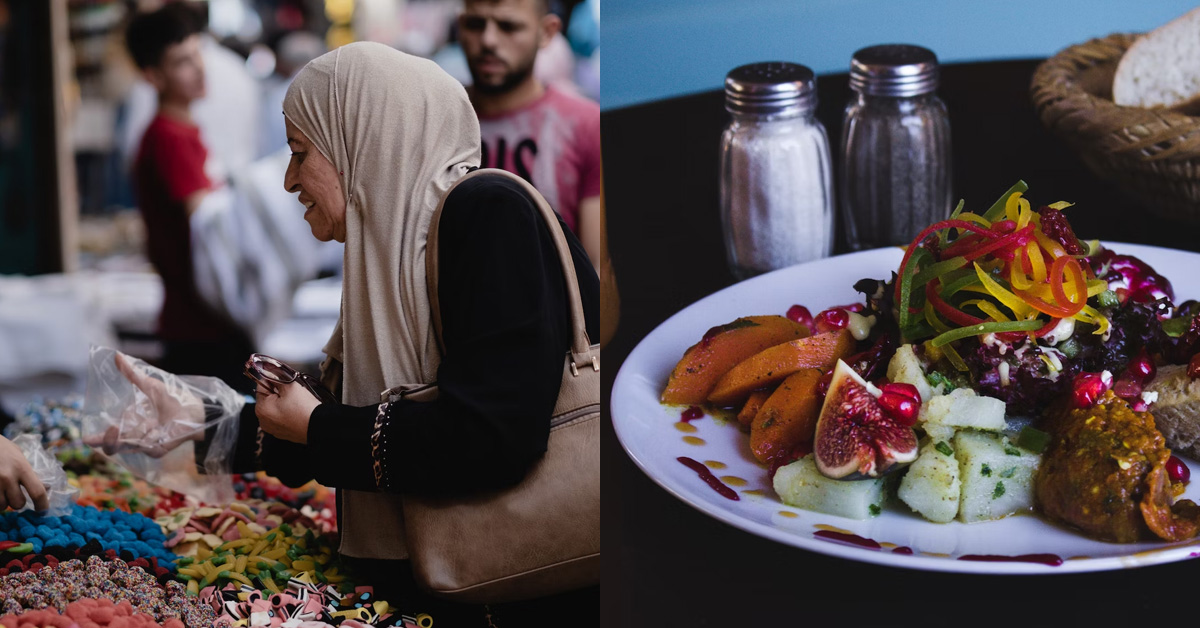Palestinian cuisine is a rich and diverse culinary tradition that reflects the country’s history, culture, and geography. Palestinian food is a fusion of Mediterranean, Middle Eastern, and North African flavors, with a focus on fresh, seasonal ingredients and traditional cooking techniques.
The cuisine is characterized by its use of herbs and spices, such as za’atar, sumac, and cumin, as well as olive oil, which is a staple ingredient in many dishes. Palestinian cuisine is also known for its vegetarian and vegan options, with dishes like falafel, hummus, and tabbouleh being popular around the world.
Palestinian cuisine halal or not?
Is Palestinian food halal?
Most Palestinian food is halal, meaning it is prepared and consumed in accordance with Islamic dietary laws. However, some dishes may contain non-halal ingredients such as pork or alcohol, so it is important to check the ingredients before consuming.
Some Palestinian dishes may be prepared in non-halal ways, such as using non-halal meat or cooking with wine, so it is important to be aware of these variations as well.
What kind of food do Palestinian eat?
Palestinian cuisine is a blend of Middle Eastern, Mediterranean, and North African influences. Some popular Palestinian dishes include:
- Musakhan: A traditional Palestinian dish made with roasted chicken, sumac, onions, and flatbread.
- Maqluba: A one-pot dish made with rice, vegetables, and meat (usually chicken or lamb).
- Falafel: Deep-fried balls made from ground chickpeas, herbs, and spices.
- Hummus: A dip made from mashed chickpeas, tahini, lemon juice, and garlic.
- Shawarma: Thinly sliced meat (usually chicken or lamb) cooked on a spit and served in a pita bread with vegetables and sauce.
- Kanafeh: A sweet pastry made with shredded phyllo dough, cheese, and syrup.
- Taboon bread: A type of flatbread baked in a traditional clay oven.
- Stuffed grape leaves: Grape leaves stuffed with rice, herbs, and sometimes meat.
- Baba ghanoush: A dip made from roasted eggplant, tahini, lemon juice, and garlic.
- Za’atar: A spice blend made from thyme, sesame seeds, sumac, and salt, often used as a seasoning for bread or meat.
How can you tell if the food is halal in Palestine?
In Palestine, halal food is typically labeled as such and can be found in halal-certified restaurants and markets. Many Muslims in Palestine follow the dietary laws of Islam and may be able to provide guidance on where to find halal food.
Is it hard to find halal food in Palestine?
Finding halal food in Palestine is not difficult as the majority of the population is Muslim, and halal food is widely available. Most restaurants and food establishments serve halal food, and there are also many halal meat shops and markets.
However, it may be more challenging to find halal food in some rural areas or smaller towns. Additionally, some non-Muslim-owned restaurants may not serve halal food, so it’s always best to ask before ordering.
Is Palestinian food healthy?
Palestinian cuisine is generally considered healthy as it is based on fresh and natural ingredients such as vegetables, fruits, legumes, and whole grains. Traditional Palestinian dishes are often low in fat and high in fiber, making them a good source of nutrients.
However, some dishes may be high in salt or sugar, so it is important to consume them in moderation.
What is Palestinian food similar to?
Palestinian food is similar to other Middle Eastern cuisines, such as Israeli, Lebanese, Syrian, and Jordanian. It features a variety of dishes made with ingredients like chickpeas, lamb, chicken, eggplant, tomatoes, and olive oil.
Some popular Palestinian dishes include hummus, falafel, tabbouleh, maqluba (a rice and vegetable dish), and shakshuka (eggs cooked in a tomato sauce).
Steps to find halal food in Palestine
Here are some tips to find halal food in Palestine:
- Research halal food options in Palestine: Start by researching halal food options in Palestine. You can use online resources such as HalalTrip or Zabihah to find halal restaurants and food options in Palestine.
- Ask locals: Ask locals for recommendations on where to find halal food. They may be able to suggest local restaurants or markets that offer halal food.
- Check food labels: When shopping for food, check the labels to ensure that the food is halal. Look for the halal certification symbol on the packaging.
- Visit halal restaurants: Visit halal restaurants in Palestine to enjoy halal food. You can find halal restaurants in major cities such as Ramallah, Bethlehem, and Hebron.
- Look for vegetarian options: If you are unable to find halal meat, look for vegetarian options. Many Palestinian dishes are vegetarian and can be enjoyed by Muslims and non-Muslims alike.
- Consider home-cooked meals: Consider staying with a local family or booking a homestay to enjoy home-cooked halal meals. This is a great way to experience Palestinian culture and cuisine.
- Be mindful of non-halal ingredients: Be mindful of non-halal ingredients such as pork and alcohol. Avoid consuming these ingredients, even if they are offered to you.

